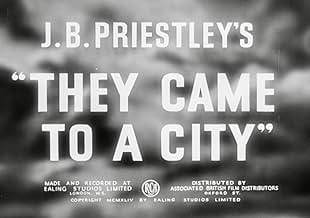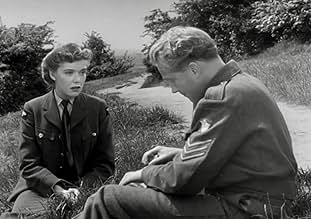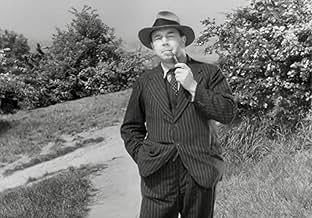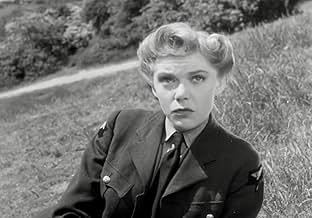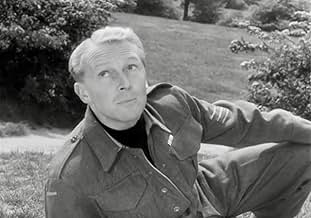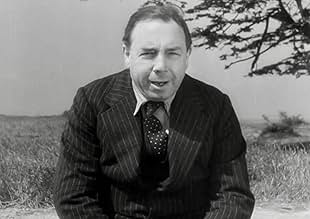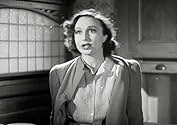Adapted from a J.B. Priestley play with many of the original actors. The tale of various people who have come to live in an "ideal" city and their hopes and reasons for doing so.Adapted from a J.B. Priestley play with many of the original actors. The tale of various people who have come to live in an "ideal" city and their hopes and reasons for doing so.Adapted from a J.B. Priestley play with many of the original actors. The tale of various people who have come to live in an "ideal" city and their hopes and reasons for doing so.
- Director
- Writers
- Stars
Mabel Terry-Lewis
- Lady Loxfield
- (as Mabel Terry Lewis)
Fanny Rowe
- Philippa Loxfield
- (as Frances Rowe)
Brenda Bruce
- WAAF
- (uncredited)
Ralph Michael
- Sergeant Jimmy
- (uncredited)
J.B. Priestley
- J.B. Priestley
- (uncredited)
Johnnie Schofield
- Bert the Barman
- (uncredited)
- Director
- Writers
- All cast & crew
- Production, box office & more at IMDbPro
6.3462
1
2
3
4
5
6
7
8
9
10
Featured reviews
Pure Utopian Propaganda - LOVED EVERY SECOND!!!
A very pleasant surprise. This is an allegory about an imagined socialist paradise, and the judgements that various archetypical citizens would have of it. I Loved it.
It happens that I watched this - on FUBI - on the same night that I watched a documentary about Jane Jacobs, the sociologist of cities and advocate of bottom-up community building. This was a perfect follow up.
It's presented as a series of exchanges between the disparate characters, contrasting their values, experience and social orientation. While it could be criticized as didactic and predictable, I found it well executed and fun. I especially loved Googie Withers as the working class gal whose been around the block a few times but isn't ready to go cynical.
In tone and flavor it's like a blend of Capra with Powell & Pressburger.
It happens that I watched this - on FUBI - on the same night that I watched a documentary about Jane Jacobs, the sociologist of cities and advocate of bottom-up community building. This was a perfect follow up.
It's presented as a series of exchanges between the disparate characters, contrasting their values, experience and social orientation. While it could be criticized as didactic and predictable, I found it well executed and fun. I especially loved Googie Withers as the working class gal whose been around the block a few times but isn't ready to go cynical.
In tone and flavor it's like a blend of Capra with Powell & Pressburger.
Nine strangers mysteriously transported to a unique city.
Nine disagreeable Britons representing different social/economic classes are mysteriously transported to a place with a door. As they wait for the door to open, we get to know them better. Eventually the door opens, and they go explore a city which the audience never sees. T The idea is that post WW2, England should become a more fair and equitable society with people who treat each other well. When the characters find themselves in such a city they have different reactions. It's interesting how some of the selfish ones try to emotionally drag those who want to live in the city back to their miserable lives. There is an episode involving a mother and daughter that is very similar to an episode in C. S. Lewis' novel "The Great Divorce" written 12 years later. It made me wonder if Mr. Lewis ever saw the film. Note: "They Came To A City" is similar to watching a stage play. At only 66 minutes long it's worth a look.
A Radiant Googie Withers
THEY CAME TO A CITY is based on a play by J.B. Preistley and stars Googie Withers and John Clements. It's sort of an "Outward Bound" story of disparate people who find themselves on a road that leads to a monolithic waiting room before a giant door. While waiting, each person explains his/her life, hopes, gripes, etc. When the door finally opens they descend in "the city." We never see it. As they emerge from the city, some are struck by the new social order, happiness of the people, the freedom, etc. while others are repelled by what they see. This utopia seems based on socialist views.
Coming toward the end of WWII, the story is framed by a couple sitting by a roadside overlooking a manufacturing city. They are arguing about what kind of world will emerge after the war. Will things be different. A man wanders by (J.B. Priestley himself) and he joins in, telling the story of his utopia.
Those who hate "the city" include a selfish dowager who browbeats her mousy daughter, a man of the landed gentry who lives on inherited money, a ruthless industrialist who makes money in order to make more money, and a jealous wife who hates anyone to has the things she wants. Those who like the city include the mousy daughter, an old charwoman, the henpecked husband, the world-weary barmaid (Withers), and the stoker (Clements) who has searched the world for a paradise.
While not very cinematic, the overall idea is quite interesting, and the actors (mostly from the stage play) are quite good. Besides Withers and Clements, the film co-stars Raymond Huntley and Renee Gadd as the Strittons, Ada Reeve as the charwoman, Mabel Terry-Lewis and Frances Rowe as the dowager and daughter, A.E. Matthews as the industrialist, Norman Shelley as the landed gentry.
Coming toward the end of WWII, the story is framed by a couple sitting by a roadside overlooking a manufacturing city. They are arguing about what kind of world will emerge after the war. Will things be different. A man wanders by (J.B. Priestley himself) and he joins in, telling the story of his utopia.
Those who hate "the city" include a selfish dowager who browbeats her mousy daughter, a man of the landed gentry who lives on inherited money, a ruthless industrialist who makes money in order to make more money, and a jealous wife who hates anyone to has the things she wants. Those who like the city include the mousy daughter, an old charwoman, the henpecked husband, the world-weary barmaid (Withers), and the stoker (Clements) who has searched the world for a paradise.
While not very cinematic, the overall idea is quite interesting, and the actors (mostly from the stage play) are quite good. Besides Withers and Clements, the film co-stars Raymond Huntley and Renee Gadd as the Strittons, Ada Reeve as the charwoman, Mabel Terry-Lewis and Frances Rowe as the dowager and daughter, A.E. Matthews as the industrialist, Norman Shelley as the landed gentry.
Inspiring but unconvincing.
Lovely piece about assorted people who discovered a happy land far far away - and some found it happier than others. But as noted elsewhere, the Utopia is portrayed without any explanation of how we got there. As another reviewer says, it captured the mood of the times. That mood produced the Attlee government - and after six years of it, it took another 13 before Labour got in again - and Harold Wilson had the sense not to promise Utopia. Unfortunately, The comparison with Lost Horizon is very apt, but Shangri-La doesn't work without it's supernatural elements - which unfortunately we don't possess.,
Will We Stay?
This is a very unusual film as its a 1940s surrealist one made by Ealing Studios and is simply unknown by the majority of the public. Trust Talking Pictures TV to bring it back to the public consciousness in 2024.
I was attracted to this film as I have a soft spot for old movies which have an air of the surreal, as its always interesting to see how fantasy elements are executed without the crux of CGI and computing power. A great example of a film that does this well is A Matter Of Life And Death.
The current film however is not on the same level, as it has less of the fantasy elements of Life And Death. It is basically a film about nine individuals from the social ranks of British society who are granted the opportunity to enter into a Utopian ideal city. The majority of the film is each character voicing their reasons of whether they have decided to stay in this city or return back to the previous lives. Where the movie falls flat is that its basically a communist propaganda reel in which the haves are evil and the have nots are virtuous. The problem with the author of this story is nobody seems to have told him that Utopia's simply don't work. People being as they are, so the entire notion of people deciding on whether to stay is irrelevant. To argue that point doesn't matter because its a movie makes no sense, because the film is an obvious social commentary. Of course its the bad people who don't want anything to do with the Utopia and the good people who do. More propaganda. But unless the author can come up with the magical way that an entire city can run where everybody is happy all the time and there are no problems because everyone works together, its a moot point to pour disdain on people who would refuse to live there. Maybe its because they know its all an unobtainable fantasy. The far left have always had this fantasy of a Utopia which they think would happen if everybody did what they said, and this movie is a great example of such flawed and simplistic reasoning. Its obvious from the ratings that many people either found this boring or recoiled at the communist slant of the narrative. Its an interesting watch for how strange it is, its simply not a great movie and its political angle comes across as extremely naive, maybe the collapse of communist societies hadn't happened yet.
I was attracted to this film as I have a soft spot for old movies which have an air of the surreal, as its always interesting to see how fantasy elements are executed without the crux of CGI and computing power. A great example of a film that does this well is A Matter Of Life And Death.
The current film however is not on the same level, as it has less of the fantasy elements of Life And Death. It is basically a film about nine individuals from the social ranks of British society who are granted the opportunity to enter into a Utopian ideal city. The majority of the film is each character voicing their reasons of whether they have decided to stay in this city or return back to the previous lives. Where the movie falls flat is that its basically a communist propaganda reel in which the haves are evil and the have nots are virtuous. The problem with the author of this story is nobody seems to have told him that Utopia's simply don't work. People being as they are, so the entire notion of people deciding on whether to stay is irrelevant. To argue that point doesn't matter because its a movie makes no sense, because the film is an obvious social commentary. Of course its the bad people who don't want anything to do with the Utopia and the good people who do. More propaganda. But unless the author can come up with the magical way that an entire city can run where everybody is happy all the time and there are no problems because everyone works together, its a moot point to pour disdain on people who would refuse to live there. Maybe its because they know its all an unobtainable fantasy. The far left have always had this fantasy of a Utopia which they think would happen if everybody did what they said, and this movie is a great example of such flawed and simplistic reasoning. Its obvious from the ratings that many people either found this boring or recoiled at the communist slant of the narrative. Its an interesting watch for how strange it is, its simply not a great movie and its political angle comes across as extremely naive, maybe the collapse of communist societies hadn't happened yet.
Did you know
- TriviaFinal film of Mabel Terry-Lewis.
- Quotes
Lady Loxfield: What is it?
Philippa Loxfield: I don't know, but I do know it isn't Bournemouth.
- ConnectionsFeatured in Sosialismi (2014)
- SoundtracksMusic selected from The Divine Poem
Music by Aleksandr Skryabin (as Scriabin)
Played by The London Philharmonic Orchestra
Conducted by Ernest Irving
Details
- Runtime
- 1h 18m(78 min)
- Color
- Aspect ratio
- 1.37 : 1
Contribute to this page
Suggest an edit or add missing content

